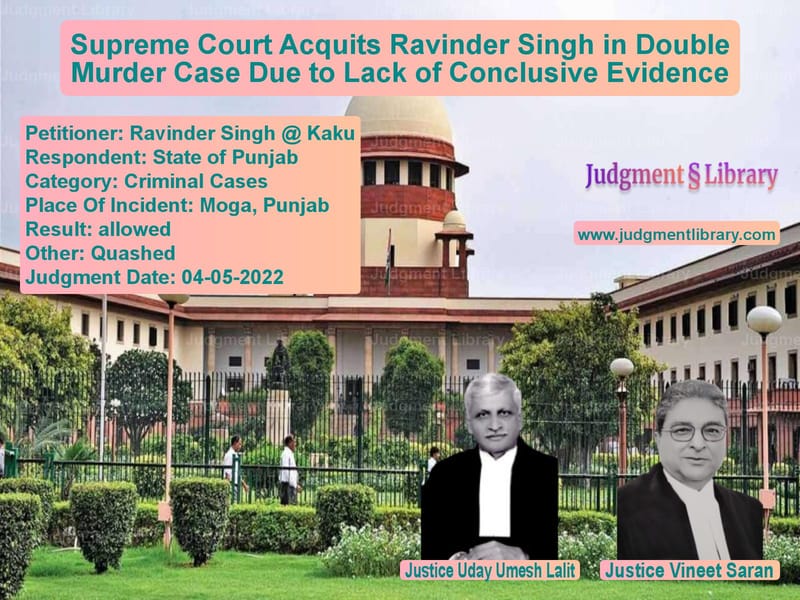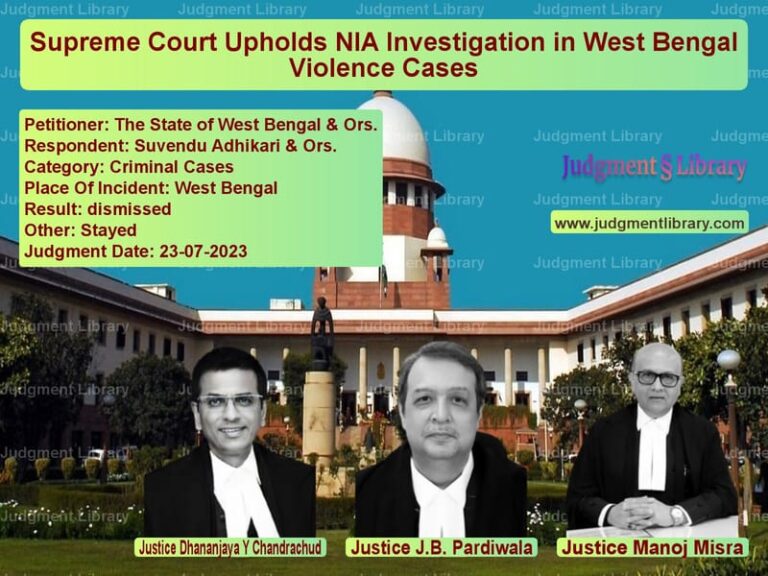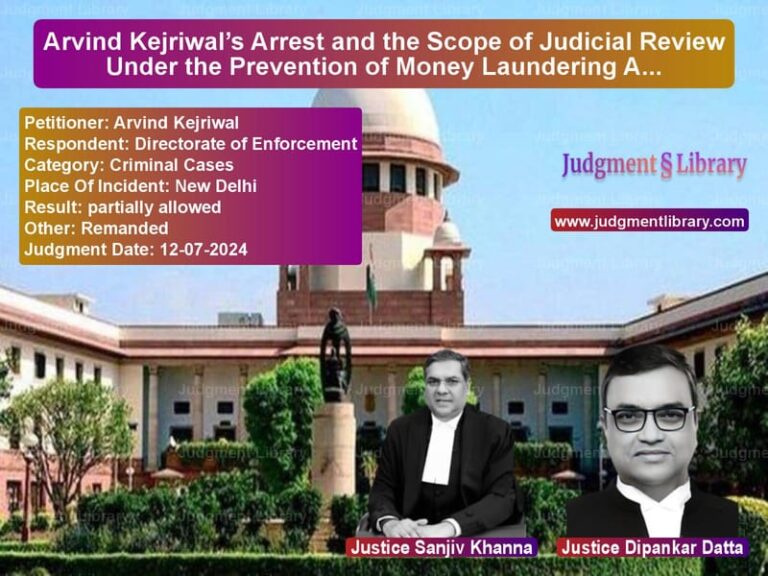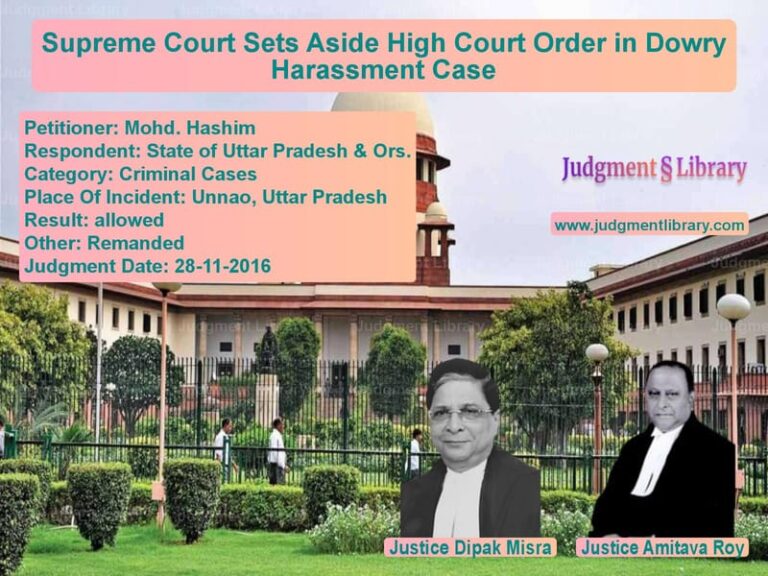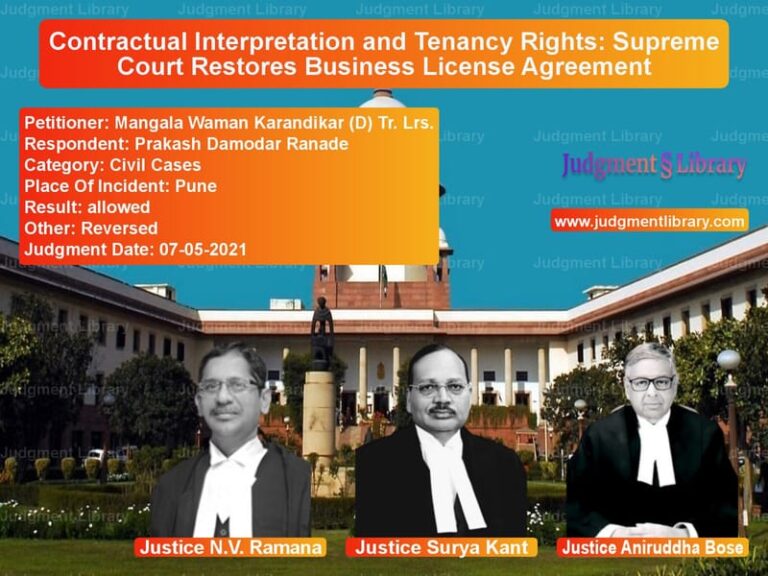Supreme Court Acquits Ravinder Singh in Double Murder Case Due to Lack of Conclusive Evidence
The case of Ravinder Singh @ Kaku vs. State of Punjab centered around the conviction of the appellant for the alleged kidnapping and murder of two children in Moga, Punjab. The Supreme Court, after reviewing the evidence, found significant contradictions and inconsistencies in the prosecution’s case and acquitted the appellant.
Background of the Case
On September 24, 2009, two children, Aman Kumar (10 years old) and Om (6 years old), went missing in Moga, Punjab. Their father, Rakesh Kumar, reported them missing after they failed to return from tuition. The next day, their bodies were discovered in a paddy field.
The police investigation led to the arrest of three accused: Ravinder Singh @ Kaku, Anita @ Arti (the mother of the children), and Ranjit Kumar Gupta. The trial court convicted all three, sentencing them to death under Section 302 read with Section 120B of the IPC and imposing 10 years’ imprisonment under Section 364 IPC.
On appeal, the Punjab and Haryana High Court acquitted Anita @ Arti and Ranjit Kumar Gupta but upheld the conviction of Ravinder Singh. However, it commuted his death penalty to 20 years of rigorous imprisonment.
Key Legal Issues
- Whether the prosecution’s evidence was sufficient to establish the guilt of Ravinder Singh beyond a reasonable doubt.
- Whether the conviction based on circumstantial evidence was justified.
- Whether the ‘last seen theory’ and call record evidence provided a conclusive link to the crime.
Arguments Presented
Appellant’s Arguments (Ravinder Singh @ Kaku)
- The case against him was based solely on circumstantial evidence without direct proof.
- The prosecution’s claim that he was ‘last seen’ with the children was based on the testimonies of two unreliable witnesses (PW6 and PW7), which contained contradictions.
- The High Court wrongly inferred an illicit relationship between him and Anita @ Arti based on call records, without direct proof.
- There were major inconsistencies regarding the discovery of the children’s school bag, weakening the prosecution’s recovery evidence.
- Electronic evidence (call records) was inadmissible under Section 65B of the Indian Evidence Act as it lacked the required certification.
Respondents’ Arguments (State of Punjab)
- The prosecution presented a clear motive, alleging that the appellant wanted to eliminate the children due to his relationship with Anita @ Arti.
- Witnesses had testified that Ravinder Singh was last seen with the children before they were murdered.
- The call records showed that Ravinder Singh and Anita @ Arti had frequent communication, supporting the motive theory.
- The recovery of one school bag at the appellant’s instance proved his involvement.
Supreme Court’s Observations
The Supreme Court found multiple flaws in the prosecution’s case:
- Unreliable witness testimony: The key prosecution witnesses (PW6 and PW7) had contradictions in their statements regarding the ‘last seen theory’ and the arrest timeline.
- No direct evidence: The entire case was based on circumstantial evidence, and the prosecution failed to establish a complete chain of events leading to the crime.
- Call record evidence was improperly admitted: The electronic evidence did not comply with Section 65B of the Indian Evidence Act, making it legally inadmissible.
- The recovery evidence was inconsistent: The prosecution initially claimed that both school bags were found with the bodies but later presented one as ‘discovered’ based on Ravinder Singh’s confession.
- Motive was not proven: The High Court assumed an illicit relationship between the accused, but there was no direct evidence proving this claim.
Key Excerpts from the Judgment
The Supreme Court ruled:
“The tripod stand of Motive, Last Seen Theory and Recovery, that supported the conviction of A2 according to the High Court, is found to be non-conclusive and the evidence supporting the conviction of A2 is marred with inconsistencies and contradictions, thereby making it impossible to sustain a conviction solely on such circumstantial evidence.”
The Court further observed:
“The inferences drawn by the High Court regarding the motive, based on call records, are speculative and unsupported by direct evidence. A conviction cannot rest on mere probability.”
Final Verdict
The Supreme Court acquitted Ravinder Singh @ Kaku and issued the following directives:
- The conviction under Section 302 and 364 IPC was set aside.
- The acquittal of co-accused Anita @ Arti and Ranjit Kumar Gupta was upheld.
- The respondent’s appeals challenging the acquittal of co-accused were dismissed.
- The jail authorities were directed to immediately release Ravinder Singh, unless he was required in another case.
Outcome: This judgment reinforced the principle that circumstantial evidence must be conclusive and free from contradictions to sustain a conviction, ensuring the accused’s right to a fair trial.
Petitioner Name: Ravinder Singh @ Kaku.Respondent Name: State of Punjab.Judgment By: Justice Uday Umesh Lalit, Justice Vineet Saran.Place Of Incident: Moga, Punjab.Judgment Date: 04-05-2022.
Don’t miss out on the full details! Download the complete judgment in PDF format below and gain valuable insights instantly!
Download Judgment: ravinder-singh-@-kak-vs-state-of-punjab-supreme-court-of-india-judgment-dated-04-05-2022.pdf
Directly Download Judgment: Directly download this Judgment
See all petitions in Murder Cases
See all petitions in Bail and Anticipatory Bail
See all petitions in Judgment by Uday Umesh Lalit
See all petitions in Judgment by Vineet Saran
See all petitions in allowed
See all petitions in Quashed
See all petitions in supreme court of India judgments May 2022
See all petitions in 2022 judgments
See all posts in Criminal Cases Category
See all allowed petitions in Criminal Cases Category
See all Dismissed petitions in Criminal Cases Category
See all partially allowed petitions in Criminal Cases Category

